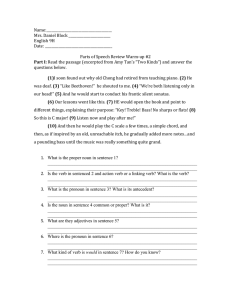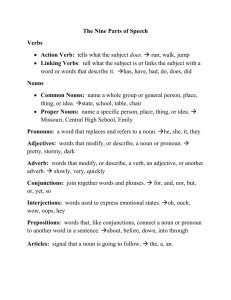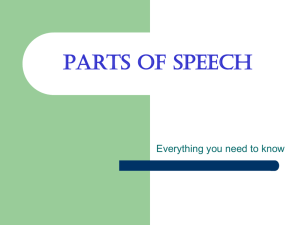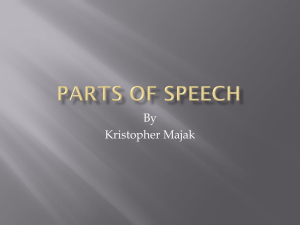Document 17913514
advertisement
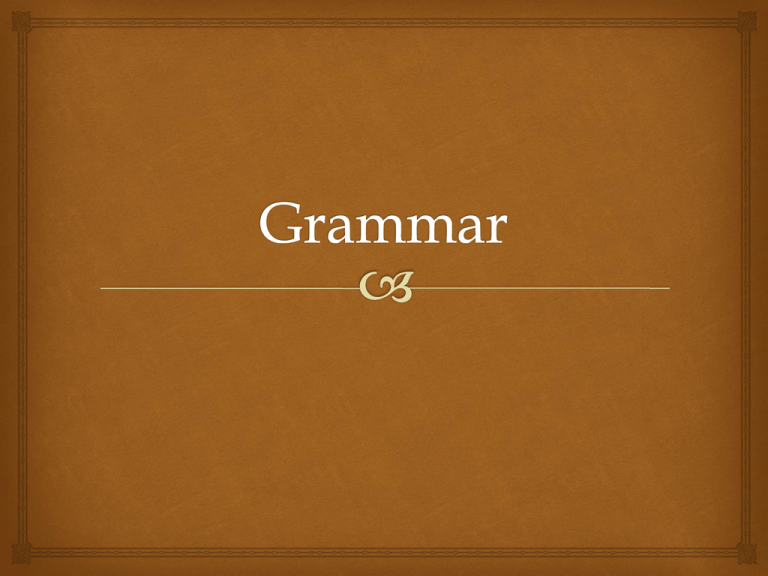
Review: 2 Parts of Sentences: Subject: Who or What Ex. The moon shone on the gravel path. Predicate: tells about the subject (includes the action) Remember: Find the VERB to start the predicate. Ex. The moon shone on the gravel path Simple V. Complete Subject Simple: the main word that tells who or what Ex. The four new students arrived early. Complete subject: all the words that tell whom or what the sentence is about. Ex. The four new students arrived early. Examples: Find the Simple & Complete Subject 1) The tall, beautiful lady sipped her tea. 2) Walking through the park, the two dogs barked. 3) A round walnut table with four lets stood in the middle of the dining room. Compound Subject Two or more subjects joined together by a conjunction that have the same verb. Ex. The dog and the cat sniffed the air. Simple V Compound Predicate Simple: the main word that tells about the subject (THE VERB) Example: The cat jumped over the desk. Compound: the verb and all the words that describe what the subject is doing. Example: The cat jumped over the desk. REMINDER Simple usually means ONE Types of Sentences: Declarative: makes a statement. Uses a period. The sky is blue. Imperative: command or request. Uses a period or an exclamation point. Remove your belongings from the desk. Remove your belongings from the desk! Types of Sentences: Interrogative: asks a question Ends with a question mark. Will you be going to the play tonight? Exclamatory: shoes excitement or strong feelings. Uses an exclamation point. The Penguins scored the final point! Nouns A word or word group that is used to name a PERSON, PLACE, THING or IDEA. Ex. Teacher, Grand Canyon, lamp, bravery Compound Nouns A single noun made of more than one word: EX. Basketball, light-year, grand piano Proper Nouns Names a particular person, place, thing or idea. Get capitalized! Ex. teacher Miss Cheatle park North Park city Pittsburgh Come up with proper nouns! Lake Phone company Brand Sports Team Road Restaurant Concrete Nouns and Abstract Nouns Concrete: Names a person, place or thing that can be perceived by one or more senses. Ex. Photograph, book, pen, friend Abstract: Names an idea, feeling, quality or characteristic. Ex. Love, tired, bold, courage Collective Nouns Word that names a group: Ex. Batch, litter, team, class The team lined up to begin practice. Pronoun A word that is used in place of one or more nouns. Ex. Ask Dan in Dan has done Dan’s work. Ask Dan if he has done his homework. The word that the pronoun stands for is the antecedent (DAN). Pronoun Practice When Mary went to the store, Mary bought flowers for Mary’s grandmother. REWRITE THIS SENTENCE USING PRONOUNS 2 WAYS Put the flowers in the water before the flowers droop. Ben folded the paper for Mrs. Burg, and then Ben stuffed the newspapers in the plastic bags for Mrs. Burg. Personal Pronoun Refers to the one speaking, the one spoken to, or the one spoken about. Singular Plural First Person I me my mine we us our ours Second Person you your yours you your yours Third Person he him his she her hers it its they them their theirs Personal Pronoun Practice Tim said “Tim answered all six questions on the quiz.” Jane and Lauren yelled “Jane and Lauren know!” The teacher asked the students to put the student’s names on the paper. Reflexive Pronouns Reflexive: refers to the subject and is necessary to the meaning of the sentence. Tara enjoyed herself at the party. The team prided themselves on their victory. Add a Reflexive Pronoun John worried John about the storm. The cat groomed the cat by licking its fur. The weight of the cake collapsed the cake. Intensive Pronouns Intensive: emphasizes a noun or another pronoun and is unnecessary to the meaning of the sentence. I myself cooked that delicious dinner. Did you redecorate the room yourself? Add a Intensive Pronoun Did you eat all of those cookies? I cleaned all the dishes. Sarah completed the entire group project. Demonstrative Points out a person, place, thing or idea Ex. This that these those The grammar lesson is really fun. This lesson is really fun. Demonstrative Noun Examples I love the red shoes! Did you order the salad? She cannot read the book. Interrogative Introduces a question. Ex. Who Which What Whom Whose What is the name of your pet turtle? Interrogative Examples ___________ dropped the pencil? ___________ did the noise come from? ____________ are you doing this weekend? Indefinite Refers to a person, place, thing or idea which may not be named. Ex. All, more, none, one… All of the students enjoyed learning about grammar. Indefinite ________________ of the girls were talking on the phone. ________________ did their homework. Relative Introduces a subordinate clause Ex. That which who whom whose Exercise is something that many people enjoy. Relative examples Does Pamela, ________ is going to Europe, have her passport? Thomas Jefferson, __________ wrote the Declaration of Independence, was our country’s third president. The book, _________ was long, was very interesting. VERBS A verb is a word that expresses an action or state of being. Ex. We celebrated the Chinese New Year yesterday. Ex. The holiday is usually in February. Action Verbs An action verb is a verb that expresses either physical or mental activity (doing something) Ex. The owls hooted all night. (m or p?) Gloria plays volleyball. (m or p?) She thought about the problem. (m or p?) I believe in you. (m or p?) Linking Verbs A linking verb is a verb that expresses a state of being. A linking verb connects, or links, the subject to a word or word group that identifies or describes the subject. Ex. Denzel Washington is an actor. Ex. The children remained quiet. HINT- linking verbs never have objects. Helping Verbs A helping verb (aux verb) helps the main verb express action or state of being. Ex. The packages were sent to 401 Maple Street. Transitive Verb A verb that expresses an action directed towards a person, a place, a thing or an idea (words that receive action are objects) Ex. Derick greeted the visitors. Intransitive Verb Expresses action without the action passing to a receiver or object. Ex. Last night we ate on the patio. Adverbs An adverb is a word that modified the verb, an adjective or another adverb (AD’s to the VERB) Can appear before, after or between the words they modify. They answer the questions: Where When How How often To what extent Adverbs The sprinter ran swiftly I read the comics early on Sunday morning. Dad will sometimes quote Harry Potter. Put the apples there, and we will eat them later. Prepositions A word that shows the relationship of a noun or pronoun to another word. The cat walked to the door. The cat walked through the door. The cat walked past the door. The cat walked in front of the door. Conjunctions A word that joins words or word groups. And, but, for, nor, or, so, yet, both, either, neither…. She read the book, but she had not seen the movie. Ann or Jill will read the part. Interjections A word that expresses emotion. Aha, my, ouch, wow, hey, oh, rates, yikes, hurray, oops, well, yippee…. OUCH! That hurts! Aha! I know the answer! Oh, I wish it were Friday!
